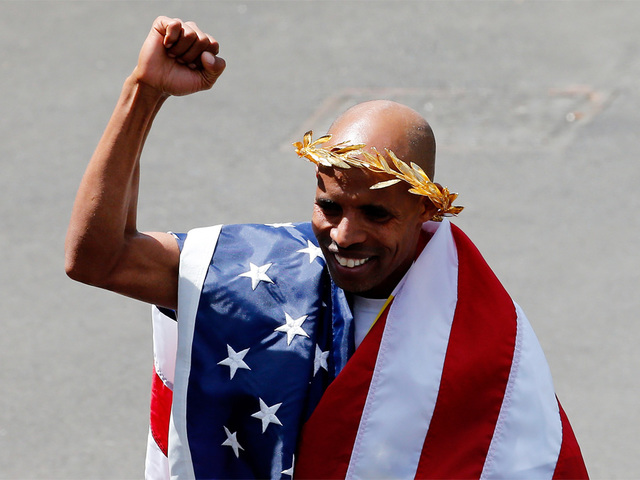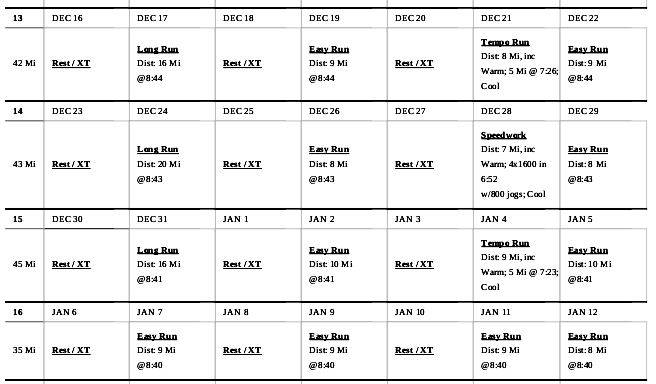“The well-prepared marathoner looks after every detail of proper physical and mental training, nutrition, hydration, clothing, and equipment.”
— Amby Burfoot (running guru and winner of the 1968 Boston Marathon)
Photo: Meb Keflezighi, who in 2014 became the first American to win the Boston Marathon since 1982
This attention to a wide range of details occurs over months of training, all with the ultimate goal of running 26.2 miles. Musicians should train for performance the same way runners train for marathons: with great organization and structure. Marathon training plans are highly detailed, with specific goals for each day. All facets of daily life become focused around achieving a personalized and realistic goal. This goal is set for one race, and is based on previous experience and current fitness. Both running and music are daily disciplines that require balancing many elements of an individual’s personality, physiology, motivation, effects of previous success/failure, and demands from other areas of life.
There are certain ways in which marathon training plans are so specific that is difficult for musicians to emulate. Most obviously, music cannot be quantified in the same way that running can be measured by distance and pace. Since both activities are largely unsupervised, the runner seems to have an advantage over the musician: she can go by the numbers and clearly track her progress. The musician has the more difficult task of being an objective viewer of her own playing. Indeed, one of the greatest challenges for a musician is to learn how to self-supervise and practice effectively. Marathon training provides general concepts and tactics that the musician can adapt in order to improve long-term training goals and structuring individual practice sessions.
Forming a training plan itself is crucial. A runner may hire a coach, read multiple method books, and receive advice from fellow runners and magazines. The experienced runner will carefully plan the next race, based on what worked previously and what did not–this may result in small adjustments or a radical shift to a new coach or training method. Musicians do follow a similar process of selecting a teacher and school, but it can be perhaps less deliberate and predictable. Musical study is rooted in a master-teacher/student tradition akin to the old economic model of apprenticeship. It can be very complicated to change teachers or schools. Also, how does one proceed when no longer enrolled at a school? The role of the teacher is complex and fascinating in its own right, and will be discussed later. Here, it is important to acknowledge the need for teacher and student to sit down together to assess current abilities, set clear goals for progress, carefully choose repertoire, articulate practicing strategies, layout a rough training schedule, and re-assess progress throughout the course of training. The older musician without a teacher must learn to objectively view her own playing and manage the training process mostly by herself.
A typical marathon training plan spans roughly 16 weeks and begins from an established base of fitness. The training plan will contain specific goals for each day, week, and cycles of about four weeks. Workouts are varied, containing Easy, Speed (intervals), Tempo (sustained faster pace workouts), and Long workouts. Weekly distance is carefully planned. Rest is built into the week and into four-week cycles, to allow for mental and physical recovery. A taper period in the final days assures that the body will be at its best on race day.
Take a look at a four-week cycle of a training plan I completed a year ago:
So, how can a musician adapt the most general principles from marathon training?–
- within each week, plan more intense days of practicing, and more performance-oriented, enjoyable days
- over larger sections of months or seasons, build in more restful/enjoyable playing. These can be planned while taking other performances travel, coursework, holidays, and life events into consideration.
- develop specific types of “workouts,” based on your repertoire, and plan which etudes, scales, pieces to practice. Workouts should target specific elements like stamina/projection, agility, intonation, vibrato, articulation, rhythm, etc.
- without avoiding practicing altogether, plan other “cross-training” activities that will feed your creativity and help you feel refreshed: go on a hike, watch a movie, read a book, take a nap, visit a museum or art gallery, eat delicious food, or go for a run!
- be prepared early: carefully plan your practicing for the week of your performance (especially that day and 1-2 days before). Include deliberate rest and other restorative activities during that week, so that you feel physically fresh and mentally excited.
Creating a long-term “training plan” for musical performances is invaluable. Its mini-goals allow us to maintain high motivation levels and provides accountability through clear benchmarks.








